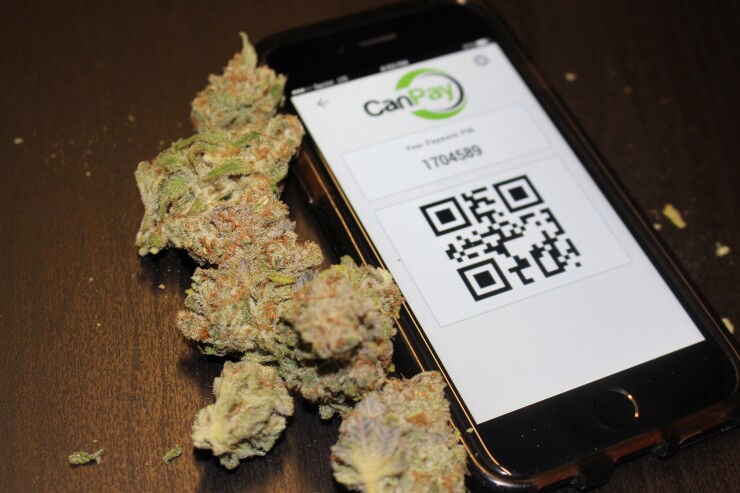In Amsterdam, it's understood that going into a
Starbucks, for example, achieved rapid adoption of its mobile card app by building it on top of the highly successful Starbucks closed-loop gift card. Such a model could also apply to the cannabis market, which is largely shunned by mainstream banks and card networks for its hazy legal status. Today, such stores primarily run on cash.
“The card brands don’t want to operate in this market,” said Dustin Eide, CEO of CanPay. “We felt this created an opportunity for us. We are payments professional first and that’s why it has been successful. We feel validated.”

By working within guidelines that appear to be
The CanPay purchasing experience resembles that of using the Starbucks or Dunkin' Donuts app — the app uses a one-time token and PIN, and a QR code that the cashier scans from the smartphone's screen.
“We want to provide a stable and transparent payment alternative for retailers to be able to offer to their retail customers,” Eide said. “It’s seamless, just like a Starbucks experience.”
It is hard not to draw similarities between CanPay Debit and popular mobile apps from the likes of PayPal, Venmo and Starbucks in terms of how they operate. When CanPay customers sign up for the service they are verified with standard know-your-customer procedures and are asked to download an app.
“The app provides an additional payment option for our customers ,which gives us a competitive advantage,” said Cam Martin, assistant director of retail services for Cansortium Holdings LLC, which operates medical cannabis dispensaries in Florida, Pennsylvania and Puerto Rico under the retail brand name Knox Medical.
“Many of our customers are older and are in the habit of paying with credit cards and not cash," Martin said. "Getting them to download the app and teaching them how to use it fosters that loyalty to the store and helps us in building that service relationship.”
CanPay charges retailers a 2% fee for the service, and there is no fee for retail consumers and medical patients. It provides the retailer a guarantee of up to $500 per transaction against fraud. If that limit seems high for a card account that can be used to buy only one product, it's because medical marijuana is still a gray area for health care coverage.
“You can choose to set a lower maximum transaction limit for CanPay Debit, but when medical cannabis is not yet covered by traditional insurance, some customers need to be able to have the ability to make larger purchases with the app so we set it at the maximum amount," Martin said.

The biggest challenge facing CanPay is establishing the brand across retail and medical dispensaries. Much like when Visa and Mastercard started out, reaching a wider retailer acceptance footprint is key to its growth. Eide reports that he has had greater success in medical cannabis dispensaries where consumers tend to frequent the same store and develop a relationship with the staff.
Tim Cullen, CEO of Colorado Harvest, a cannabis retailer based in Colorado that is a customer of CanPay, says the retail market is very different from medical cannabis market since the retail customer tends to be more price sensitive and shops several different dispensaries with little loyalty.
“Unless you have wider acceptance of the app, a customer is not likely to download it for one store he may visit only some of the time,” Cullen said.
Other vendors to legal marijuana dispensaries offer
These workarounds exist only because of the U.S. and state governments' conflicting stances on marijuana legalization.
“It’s high time the federal government recognize that they’ve created the current situation, and that they either need to be part of the solution or step aside so the industry and states can solve it," Cullen said.




